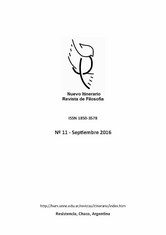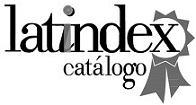¿Qué significa ser derrotado por los placeres? Hedonismo y akrasia en el Protágoras de Platón
DOI:
https://doi.org/10.30972/nvt.2118420Palavras-chave:
placer, bien, hedonismo, virtud, PlatónResumo
El propósito de este trabajo es analizar el argumento final del Protágoras, donde Sócrates introduce la cuestión del placer y su relación con el bien. Con este fin, es necesario recoger los argumentos iniciales donde se plantea, en primer lugar, la cuestión de la enseñabilidad de la virtud (aretê) y el posterior intento de alcanzar un criterio unificador de sus diversas manifestaciones, que se centrará en su carácter sapiencial. Este itinerario permitirá arrojar luz sobre los argumentos socráticos a partir de 351b y la introducción del hedonismo, lo cual nos permitirá delimitar la postura de Sócrates en relación con el problema de la akrasia. El conocimiento de las virtudes –entendido como sabiduría– será condición necesaria para el recto obrar, y, en consecuencia, quien es vencido por el placer en realidad ignora lo que en verdad es mejor.
Referências
Adkins, A. W. H. (1972). Moral Values and Political Behaviour in Ancient Greece. From Homer to the End of the Fifth Century. Chatto & Windus Ltd.
Bieda, E. (2011). Creer o saber, esa no es la cuestión. Opinión y conocimiento en el Protágoras de Platón. Circe, 15(1), 27–40. https://cerac.unlpam.edu.ar/index.php/circe/article/view/2494
Bieda, E. (2021). Platón y la voluntad. Acción, razón y deseo en la obra platónica. Miño y Dávila.
Bobonich, C. & Destrée, P. (Eds.). (2007). Akrasia in Greek Philosophy. From Socrates to Plotinus. Brill.
Boeri, M. (2007). Apariencia y realidad en el pensamiento griego. Investigaciones sobre aspectos epistemológicos, éticos y de teoría de la acción en algunas teorías de la antigüedad. Colihue.
Bossi, B. (2008). Saber gozar. Estudios sobre el placer en Platón. Trotta.
Brickhouse, T. & Smith, N. (2007). Socrates on Akrasia, Knowledge, and the Power of Appearence. En C. Bobonich & P. Destrée (Eds.), Akrasia in Greek Philosophy. From Socrates to Plotinus (pp. 1–17). Brill.
Cairns, D. L. (1993). Aidôs. The Psychology and Ethics of Honour and Shame in Ancient Greek Literature. Oxford Clarendon Press.
Calvo, T. (1989). De los sofistas a Platón. Política y pensamiento. Cincel.
Capra, A. (2003). Dialoghi narrati e dialoghi drammatici in Platone. En M. Bonazzi e F. Trabattoni (Eds.), Platone e la tradizione platonica. Studi di filosofia antica (pp. 3–30). Cisalpino.
Carone, G. (1997). Virtud y conocimiento en los diálogos socráticos: una red de paradojas. Méthexis, X, 129–139.
Divenosa, M. (2006). Platón. Protágoras. Losada.
García Gual, C. (1981). Platón. Diálogos (vol. 1). Gredos.
Giannantoni, G. (2005). Dialogo socratico e nascita della dialettica nella filosofia di Platone. Bibliopolis.
Gómez–Lobo, A. (1998). La Ética de Sócrates. Editorial Andrés Bello.
Gonzalez, F. J. (2014). The Virtue of Dialogue, Dialogue as Virtue in Plato’s Protagoras. Philosophical Papers, 43(1), 33–66. https://doi.org/10.1080/05568641.2014.901694
Gosling, J. C. B. & Taylor, C. C. W. (1982). The Greeks on Pleasure. Oxford Clarendon Press.
Guthrie, W. K. C. (1971). The Sophists. Cambridge University Press.
Irwin, T. (2000). La ética de Platón. Universidad Nacional Autónoma de México.
Jaeger, W. (1983). Paideia. Los ideales de la cultura griega. Fondo de Cultura Económica.
Kahn, C. (2006). Socrates and Hedonism. En L. Judson & V. Karasmanis, Remembering Socrates. Philosophical Essays (pp. 50–57). Oxford Clarendon Press.
Kahn, C. (2010). Platón y el diálogo socrático. El uso filosófico de una forma literaria. Escolar y Mayo.
Lefebvre, R. (2011). Platón, filósofo del placer. Biblos.
Romilly, J. de (2010). Los grandes sofistas de la Atenas de Pericles. Gredos.
Rowe, C. (1979). Introducción a la ética griega. Fondo de Cultura Económica.
Solana Dueso, J. (1997). Sofistas. En C. García Gual (Ed.), Historia de la Filosofía Antigua (pp. 89–112). Trotta.
Taylor, C. C. W. (1991). Plato. Protagoras. Oxford Clarendon Press.
Vallejo Campos, Á. (2018). Adonde nos lleve el logos. Para leer la República de Platón. Trotta.
Vegetti, M. (2005). La ética de los antiguos. Síntesis.
Vigo, A. G. (2001). Platón, en torno a las condiciones y la función del diálogo cooperativo. Tópicos. Revista De Filosofía De Santa Fe, 8–9, 5–41. https://doi.org/10.14409/topicos.v0i8–9.7404
Vlastos, G. (1956). Introduction. Plato. Protagoras (B. Jowett, trad.; M. Ostwald & G. Vlastos, eds.). The Bobbs–Merrill Company.
Vlastos, G. (1973). The Unity of the Virtues in the Protagoras. Platonic Studies (pp. 221–265). Princeton University Press.
Vlastos, G. (1991). Socrates. Ironist and Moral Philosopher. Cambridge University Press.
Wolfsdorf, D. (2006). The Ridiculousness of Being Overcome by Pleasure: Protagoras 352b1–358d4. Oxford Studies in Ancient Philosophy, 31, 113–136. https://sites.temple.edu/dwolf/files/2020/06/Ridiculous.pdf
Zeyl, D. (1980). Socrates and Hedonism: Protagoras 351b–358d. Phronesis, 25, 250–269.
Downloads
Publicado
Versões
- 2025-07-22 (6)
- 2025-07-17 (5)
- 2025-07-17 (4)
- 2025-07-02 (3)
- 2025-07-01 (2)
- 2025-07-01 (1)
Como Citar
Edição
Seção
Licença

Este trabalho está licenciado sob uma licença Creative Commons Attribution-NonCommercial 4.0 International License.
Les autores ceden a Nuevo Itinerario los derechos de publicidad de sus trabajos, toda vez que hayan sido admitidos como parte de alguno de sus números. Ello no obstante, les autores retienen los derechos de propiedad intelectual y responsabilidad ética así como la posibilidad de dar difusión propia por los medios que consideren.












51.jpg)

